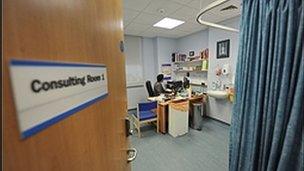NHS changes: The picture now
- Published

GP groups get ready to manage budgets
The law behind the largest reorganisation in the history of the NHS is still making its way through Parliament.
To meet various deadlines set out in the government's plans significant change is already under way.
The government says the bill will provide a sustainable structure and stability for the health service.
Labour and other critics say the bill could be dropped, but certain changes kept.
GPs get ready to take on budgets
Across England almost every GP practice has joined with neighbouring surgeries to form what are called Clinical Commissioning Groups, or CCGs. GPs were told they either had to form their own local groups or be allocated to one.
In some areas they had already been working together to spend small amounts of NHS money, so structures emerged quite quickly. There are currently around 240 CCGs but that number may decrease.
In the acronym-heavy world of the health service it is easy to get confused, but these groups will play a crucial role, taking over legal responsibility for an estimated 拢65bn a year of NHS spending from April 2013.
They will have to plan and buy healthcare for their local community, everything from paying for routine operations to meeting the drugs bill for patients.
Whether they are happy or not with the health bill, many GPs have taken a pragmatic view that they have to get on with the job.
Not all CCGs will be ready to take on budgets in 2013, and they will have to be centrally authorised before they take control.
Local NHS trusts merge
The 152 local NHS primary care trusts (PCTs) that currently manage most of the NHS budget in England still hold legal responsibility for that money but - faced with abolition - have lost staff.
These trusts have merged at a senior managerial level to form 51 clusters.
Some staff will stay on after the PCTs are due to be abolished in 2013 in organisations that will continue to advise the new GP-led groups on how to plan and buy healthcare.
These commissioning support services are meant to exist as organisations outside the NHS by 2016.
In the long term it will be up to GPs whether they continue to use these former NHS managers or buy in advice from elsewhere.
National Commissioning Board prepares
Some specialised care will have to be planned at a national level, and that job will fall to a new National Commissioning Board.
The NCB exists already in a shadow form and David Nicholson, the current CEO of the NHS, has been appointed as its first chief executive.
A chairman and directors have also been appointed and the board has held its first couple of meetings.
At this stage its role is mainly to get up and running so there is a smooth handover as the health service goes through this upheaval.
While the existing regional level of the NHS is going, the board will have regional offices.